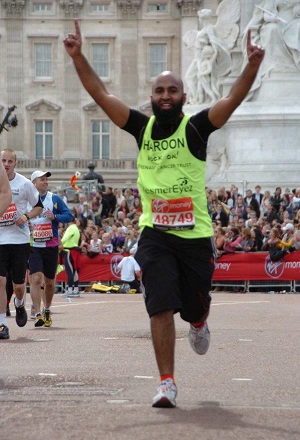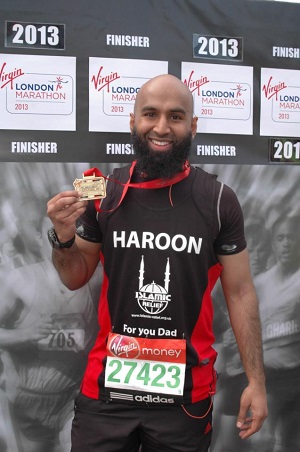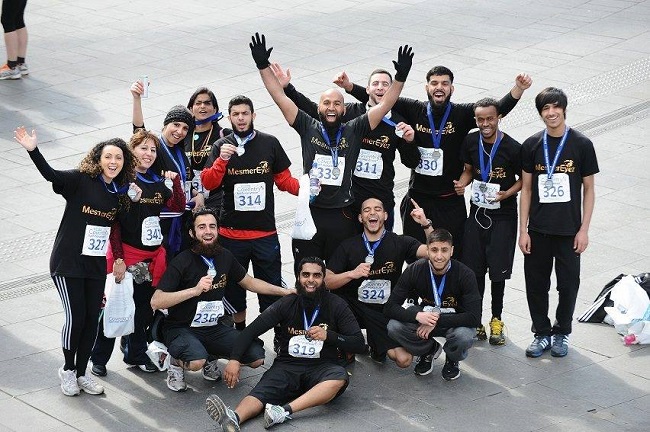#Life
Haroon’s Marathon Mission: One Man’s Race to Help Teens Fight Cancer
Published

If all goes well, Haroon Mota will cross the finish line at the 2015 London Marathon about two hours after the winner would have broken the tape.
By the time pre-race favorites such as world record holder Dennis Kimetto, defending champion Wilson Kipsang and three-time Olympic gold medalist Kenenisa Bekele take care of their business, Mota should be about halfway through the 26.2-mile course, pushing his body and mind to come in under his goal of four hours — only twice as slow as the fastest marathoners in the world.
Keep supporting MuslimMatters for the sake of Allah
Alhamdulillah, we're at over 850 supporters. Help us get to 900 supporters this month. All it takes is a small gift from a reader like you to keep us going, for just $2 / month.
The Prophet (SAW) has taught us the best of deeds are those that done consistently, even if they are small. Click here to support MuslimMatters with a monthly donation of $2 per month. Set it and collect blessings from Allah (swt) for the khayr you're supporting without thinking about it.
But no matter how many of the 30,000-plus amateur and professional runners who will take to the streets of London on April 26 finish ahead of Mota — and no matter how many of them he beats — he is competing for a cause that ensures he can call himself a champion at the end of the day.
The 29-year-old Youth Support Coordinator for University College London Hospitals is running this year’s marathon to support Teenage Cancer Trust, with a goal of raising £10,000 (about $14,786 US dollars) for the trust.
Mota was raised in a Muslim family in Coventry, England. As a teenager he got involved in Tae Kwon Do and kickboxing, and today still practices mixed martial arts occasionally. But in recent years, Mota has essentially turned himself into a distance runner for several charitable causes — sacrificing time he could devote to a sport he loves to instead focus on a sport that allows him to help people.
With a couple of weeks to go before the London Marathon, and closing in on reaching his fundraising goal, Mota talks about his marathon mission and motivation:
[divider]Interview[/divider]
MUSLIMMATTERS: What is Haroon’s Marathon Mission?
HAROON MOTA: My mission is to run 26.2 miles at this year’s London Marathon on April 26th, with the aim of raising £10,000 for Teenage Cancer Trust. Although the actual challenge is to run 26.2 miles on race day, the training regimen and the amount of miles you have to run in preparation is really tough too. So it’s also my mission to get to race day in the best physical and mental condition possible.
MM: How did this idea become a reality?
HM: Many years ago, I began volunteering for the charity Islamic Relief. It was quite a coincidence, actually. I was trekking down Mount Snowdon when I bumped into a group of Muslim ladies who were climbing with Islamic Relief, and when I learned about what they were doing, it really inspired me to get involved with the charity myself. I signed up to one of their sponsored international challenges in 2008 during my final year at University; a trek to Mount Everest Basecamp. This was an incredible two-week trek in the Himalayas reaching 18,000 feet, and I managed to raise £20,000 for their Orphan Campaign. The trek itself and the fundraising was such an enjoyable experience for me, that this passion of sponsored challenges just grew within me, and I’ve never stopped since, Alhamdulillah!
Back then, I was just climbing mountains. I also took on the Peru Trek, the 3 Peaks Challenge and climbed other smaller mountains in the UK.
I took up a job in London back in 2011 to work on the Teenage Cancer Ward at UCLH Hospital, and it was rather strange arriving in London early in the morning every day and seeing so many people running on the streets. I hadn’t seen anything like it at home where I live in Coventry, and thought it was amazing. When I learned that the Teenage Cancer Trust were recruiting for the London Marathon, I thought I’d give it a go. I’d never even run a 5k race before — how on earth was I going to run 26.2 miles? That’s what I was thinking, but I thought it would be a one-off thing that I’d try. It also made sense to support a charity that funded all the great work we were doing at the hospital to support young people with cancer.
MM: For a lot of people, running their first marathon is enough of an undertaking, but you were also going around getting donations while training for this thing you’d never done before. It seems like a lot to handle at once.
HM: I signed up for the 2012 London Marathon without giving it too much thought. London was hosting the Olympics that year, and there was a real buzz. I thought I’d do something interesting myself. I didn’t realize the enormity of the challenge ahead of me when I actually took to the road to commence training. I found it very tough. I ran my first-ever half marathon six months before the full marathon, and I remember completing the 13.1 miles in total exhaustion and asking myself, “How on earth could I turn around and run all of that again? Twenty-six miles is going to be a killer.”
When signing up, the charity requires you to raise a minimum of £2000, but I’ve always aimed high when fundraising and set myself a £5000 target. This meant that I had to get busy with sponsorship requests both online and in-person. I use Facebook and Twitter quite a bit, and they’ve really helped me generate support and raise awareness about the causes I’ve supported.
Every time I take on a challenge I’m amazed by the incredible support I get from the public. I’m not shy when it comes to asking for money. My friends sometimes joke about how shameless I am, but there is no shame when it comes to raising money for great causes. I do it with pride. I was able to raise over £7000 and it really spurred me on.
MM: Were you a runner before you got started with this? What was your athletic background?
HM: I was never a fan of distance running. We were never offered [track and field] or cross country running at school, so it’s quite new to me. I don’t think I have an ideal physique for distance running either; I’m 83 kilograms with very heavy legs, so it is hard work for me and I have a long way to go.
My athletic background is martial arts. I started kickboxing at the age of 15 after doing very well at Tae Kwon Do as a junior. I competed in full contact kickboxing between 2001 and 2006, but had to stop to focus on University. I still train and practice mixed martial arts; mainly Muay Thai and grappling and wrestling, but it’s difficult to balance training regimens when marathon training too. I’m hoping I can find a balance soon and maybe complete in kickboxing again in the near future, God willing.
MM: Would you consider yourself an experienced or high-level runner now?
HM: Running is still rather new to me. I’m still learning so much. But Alhamdulillah, I’ve ran 14 half marathons already. I enjoy these a lot more because you don’t have to train as much, and I’m able to run quicker and push myself a lot more over the shorter distance. Although, I wouldn’t call running hard for two hours easy. In 2013, I ran four half marathons on consecutive weekends and raised £5000 for Syria, then last year I went a step further and ran five half marathons in as many weekends, raising £5000 for Gaza. These were great campaigns too, and were a real test of endurance and determination.
MM: What is your target time for this year’s marathon?
HM: Four hours. I’ll be over the moon if I get below four hours. It’s going to be very tough, though, and the conditions have to be right. If I can get my pace right and hit halfway without pushing too hard, then I’ll have a good chance.
I’ve lost one kilogram in the last week and hope to lose one more before race day. Over 26 miles, even a pound of weight loss can be a minute advantage.
MM: Have you ever been in training for a race during Ramadan?
HM: I’ve never had to train during Ramadan. I usually race in October and start training immediately after Eid. I do like to stay active, though, and will go for a light run once a week to maintain some fitness. Last Ramadan, the Islamic Help Charity held a 10-mile fasting run, and I took part. I had to ensure I hydrated well the night before. It’s amazing how much you can push your body even during an 18-hour fast.
MM: What do you do in your day job at the hospital?
HM: I work on Teenage & Young Adult Cancer Wards at UCLH as a Youth Support Coordinator, providing recreational, therapeutic and emotional support to young people who have cancer.
I grew up being involved in a lot of youth work, so I had vast experience with young people. After graduating from university with a degree in Sports & Exercise Science, I found it difficult to secure employment in my preferred field, but thought I could apply myself well in the health industry with the experience and skills I had. I have a very rewarding job; being able to help young people and their families cope with cancer is a huge blessing, and I don’t need much encouragement to run marathons if it means raising funds to support the very young people I work with.
MM: What other sports are you into?
HM: I’m a huge fan of football and usually play every week, although I have to stop playing when marathon training to minimize injury risk. I’m also a huge fan of Ashtanga Yoga. The stretching really helps reduce the muscle tightness I get from running and the core strength and flexibility work really compliments my martial arts, too. I also love mountaineering. There’s nothing more enjoyable than reaching the summit of a mountain then running back down again!
MM: What about Islam appeals to you?
HM: I like that we have guidance — through the word of Allah and the Sunnah — for all aspects of life. There is an answer to everything and we have the most incredible role model and example to follow in Prophet Muhammad 
I love the unity and brotherhood that Muslims can have. The salaam is just beautiful; how we can be anywhere on the globe but have a universal greeting that binds us.
MM: We see minority athletes and athletes who come from Muslim-majority countries mostly dominate distance running on the elite professional level, but I’m not sure if there is as much representation on the recreational or amateur level. From your experience, is there a shortage of minorities and Muslims involved in running? And females in particular?
HM: Ethnic minority individuals and communities are known to have low participation levels in exercise and physical activity, and it’s not surprising that we also have the greatest health inequalities, too. So for the benefit of health, staying active is paramount.
When I’m running marathons it’s very clear that ethnic minority and Muslim communities are underrepresented. After my first marathon appearance I made it my mission to encourage participation. For the past three years at the Coventry Half Marathon, which takes place in my hometown, I’ve managed get many others to join me in support of good causes. I had a team of 17 guys the first year and it was a huge success, as all of the team completed the half marathon, raising £7000 for the local Muslim school. The following year I had a team of 23 join me, including seven ladies, and again it was a great campaign.
These ladies had never done anything like this before, but they united together in team spirit, completing the 13.1-mile distance by jogging, running and walking, which was a great achievement. Several of these ladies came back again this year to run, and it’s great to see that they’ve been inspired and motivated to continue taking part.
MM: Because there aren’t a lot of Muslims out there, do you see yourself or your team as — whether you like it or not — ambassadors for Islam when you’re running?
HM: The news headlines are constantly dominated by negative stories about Muslims. One story dies out, and another replaces it, and (here) it’s the British Muslim public that pays the price on the streets. The British Muslim community has much to celebrate with the fantastic work that goes on, but headlines never seem to pick this up. Whenever I’m involved in a charity campaign or a sponsored challenge, I do hope that the public can see that Muslims are just ordinary people trying to do good things in society, and see us in a more positive light.
CLICK HERE to donate to Haroon’s Marathon Mission to support Teenage Cancer Trust
Keep supporting MuslimMatters for the sake of Allah
Alhamdulillah, we're at over 850 supporters. Help us get to 900 supporters this month. All it takes is a small gift from a reader like you to keep us going, for just $2 / month.
The Prophet (SAW) has taught us the best of deeds are those that done consistently, even if they are small. Click here to support MuslimMatters with a monthly donation of $2 per month. Set it and collect blessings from Allah (swt) for the khayr you're supporting without thinking about it.
Amaar Abdul-Nasir was born and raised in Seattle, Wash., and received his B.A. in Journalism from Seattle University. A sports writer and editor by trade, Amaar founded UmmahSports.net, which focuses on Muslim athletes and health and fitness in the Muslim community, following his conversion to Islam in 2013.


[Podcast] Ramadan Is Not For Your Private Spirituality | Dr Farah El-Sharif

Iranian Leader Khamenei Slain As War Brings Mayhem To The Gulf

Week 2 Recap: Has Your Teen’s Approach to Relationships Changed? | Night 14 with the Qur’an

NICOTINE – A Ramadan Story [Part 2] : Cold Turkey

When It’s Hard to Forgive: What Parents Need to Know About Islamic Forgiveness | Night 13 with the Qur’an

30 Nights with the Qur’an: A Ramadan Series for Muslim Teens

[Podcast] Guardians of the Tradition: Muslim Women & Islamic Education | Anse Tamara Gray

Where Does Your Dollar Go? – How We Can Avoid Another Beydoun Controversy

Who Am I Really? What Surat Al-‘Asr Teaches Muslim Teens About Identity | Night 1 with the Qur’an

An Unending Grief: Uyghurs And Ramadan Under Chinese Occupation

I Can’t Stop Thinking About Someone | Night 10 with the Qur’an

When to Walk Away from Toxic Friends | Night 9 with the Qur’an

What Islam Actually Says About NonMuslim Friends | Night 8 with the Qur’an

Week 1 in Review: Is Your Teen Actually Changing? | Night 7 with the Qur’an

Why Your Teen Wants to Change Their Muslim Name | Night 6 with the Qur’an
Trending
-
#Islam2 weeks ago
30 Nights with the Qur’an: A Ramadan Series for Muslim Teens
-
#Life1 month ago
[Podcast] The Parts of Being an Imam They Don’t Warn You About | Sh Mohammad Elshinawy
-
#Islam1 month ago
How to Make this Ramadan Epic | Shaykh Muhammad Alshareef
-
#Islam4 weeks ago
[Podcast] Guardians of the Tradition: Muslim Women & Islamic Education | Anse Tamara Gray













Tadar Wazir
April 11, 2015 at 12:11 PM
As-Salaam-u alaikum, Have the Bro. Haroon to check out all that there is on these two doctor: Joel Wallach and Peter Glidden. Athletes usually die younger than the average person, although they usually look to be in better shape than the average person. It’s because they use up their nutrients a lot faster than the average person, and they are not replacing their essential ones.
These two (2) doctors they know why, and have helped all people in all strata of life and health conditions to have optimal health for their condition(s), given time. Everything has a point of no return. It revolves around getting absorbable nutrition into one’s system, in the right amounts that can only come from supplements.
I’m a former Paramedic and a Certified Natural Care person whose nutritional supplements, founded by Dr. Joel Wallach, can be found at: tadarwazir.youngevityonline.com; and at a lower price from the Amazon store.
This site will give him and any interested others info on certain types of nutrition:
http://whfoods.org/genpage.php?tname=faq&dbid=7#carbo
Pingback: Haroon’s Marathon Mission: Racing to fight cancer | Ummah Sports
Smile Sadaqa
July 9, 2015 at 10:10 AM
Brother Haroon is an inspiration to us all. Taking on challenges like this is a great way to raise funds for worthy causes. I’m all for it. Must join the fun.